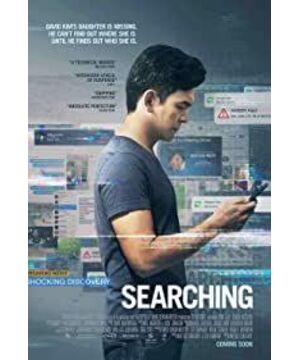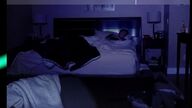Let's talk about the theme of "Network Lost" first. When I first heard the name "Wandering on the Internet", I thought it was "Wandering" caused by "Internet": the core of the story lies in the Internet. Based on this, the main contradictions and conflict points of the story should also be related to the network, such as the "lost" caused by the loopholes of the network (network information leakage) or the falseness of the network. However, this movie is not such a story. Except for the shooting method similar to computer screen capture, the core of the story is just an ordinary detective (solving a case) story, and it seems that the theme is more inclined to the reflection of people, an independent individual, on communication and exchanges (especially between relatives). ), does not seem to have reached such a level that it makes people reflect on people and networks, society and networks. It can be said that the word "Internet" refers more to the father's crime-solving tool (it can be said that the father uses the Internet as a crime-solving tool), rather than the theme that this movie wants to express.
I guess most people's first impression after watching this movie must be that this "screenshot" shooting method with no trace of shooting is really cool. Indeed, the film has a tense rhythm, not a single redundant shot, the narrative is clean and neat, and the suspense is well established. Difficulties and solutions, results and overthrow results are closely intertwined with each other. The father in the film looks for clues through his daughter’s social account and chat records. We can see video windows, chat windows, social networking pages, live video records, and through the police, we can see surveillance footage. When the truth is about to surface, Movies use online news, live TV, and TV news to tell stories to people. This kind of shooting method is a very difficult shooting method, but the director has done it, breaking through the audience's conventional thinking time and time again. What is exciting is not only the story, but also this form of storytelling that is more exciting than the story.
I just talked about the rhythm and suspense of this movie, and now I briefly talk about the production of suspense in this movie. The manufacture of suspense largely depends on the cutting of time, that is, breaking time to set suspense. For example, we want to see the result of episode A in episode A, but episode A ends abruptly at the climax. Later, we know the truth from episode B. In this movie, this B is likely to be the news broadcast. Many of the endings we were looking forward to were seen in the news broadcasts. For example, is there a body in the back seat of the car that fell into the lake? The moment the policewoman opened the trunk, the director cut the movie screen. Later, we learned from the news anchor that "fortunately, there is no body of the victim in the car" (note that at this time The time is already the next morning), in this way, the director sets the suspense by cutting the time. We were eager to see the story of the policewoman after she was taken away from the funeral home. The director showed us the surveillance video of her surrendering. We wanted to know whether her daughter was dead or alive. Later, the chat record between her and her father showed us her life. The state (note that the last chat record is from the perspective of the daughter, and it is the only shot in the whole film with the daughter as the main perspective) cuts the time. The filming method chosen for the auxiliary film has captured the hearts of the audience very well.
This shooting mode also has disadvantages. The most obvious is that time and space are limited. We all know that movies break reality and recreate time and space, and the time and space in movies are infinite and can be stretched and compressed arbitrarily. This feature of the film provides a great convenience for the short story. In "Lost on the Internet", because of the highly innovative shooting method chosen by the director, the time and place are not as flexible as ordinary movies, and even the choices of time and space are very limited, which is an extreme test of the director's skill. Of course, No matter how good the director is, there are always some small problems. For example, when a dad looks at a picture of his daughter's car in a lake, he can quickly and accurately spot the dolphin sign, which is obviously not reasonable. In real life and in most detective films, the character "detective" can never have clues at a glance. He must have carefully studied a bunch of photos for a long time before he suddenly found clues. In ordinary movies, that part of the "searching" time is dealt with by the director (for example, the director takes a bunch of pictures on the table, and the thinking detective recalls some neglected details in these pictures, or finds the Some details), because the first thing the audience sees is the unfolded photo, so they subconsciously think that the detective has studied it for a long time, so it is more reasonable to find clues after a comprehensive study. The director can also use transitions or editing to "hide" the time when the detective is thinking. In "Lost on the Internet", because it is a "screenshot" picture, the extension of the film time is limited. The father in the film must rely on his "sharpness", "intuition" and "high IQ" to find clues at a glance, that is, that "Dolphin" logo. This has both advantages and disadvantages. The good thing is that the narrative rhythm is further accelerated, and the audience's viewing experience is more refreshing. The bad thing is that it will be more or less dramatic, and it is not "infinitely close to reality". The details of the father's solution to the case are actually worth selling. Our daughter finally survived, and we felt that there was no danger. Why? Because if any one of the previous links goes wrong, what the daughter will leave to this world will be a lifeless corpse.
Finally, turn back to talk about the topic. I gave this movie five stars. Actually, in terms of the theme, it is less than five stars. Four stars should be fair and just, but its narrative style made me stunned, so I gave it five stars directly. What's wrong with the theme? When we do Chinese reading comprehension, we all know that one of the functions of the topic is to point out the main idea, the second is that it is suspense, and the third and fourth are not mentioned for the time being. Since this movie is called "The Internet Lost", I think we should work hard on the "contradiction between the Internet and people", and use the form of the Internet to tell the main theme of the Internet (with the contradiction of "Internet lost"). Cause people to reflect on network civilization) is the five-star standard in my heart. "The Lost on the Internet" must have achieved the second point. The suspense is set very well and very well, but the first point is obviously more than enough. Speaking of the story, I don't think there is anything wrong with the Internet. Helping the father find his daughter, we still think that there should be more communication and understanding between the father and the daughter (who makes the father never mention the child's mother), as for the erosion of the human spiritual civilization by the Internet, it is really not worth mentioning. Heavy.
In a word, "Lost on the Internet" is a very good movie, it is worth watching, and it is worth watching again. After all, the process of solving a case of a high-IQ father cannot be understood by watching it once.
View more about Searching reviews











